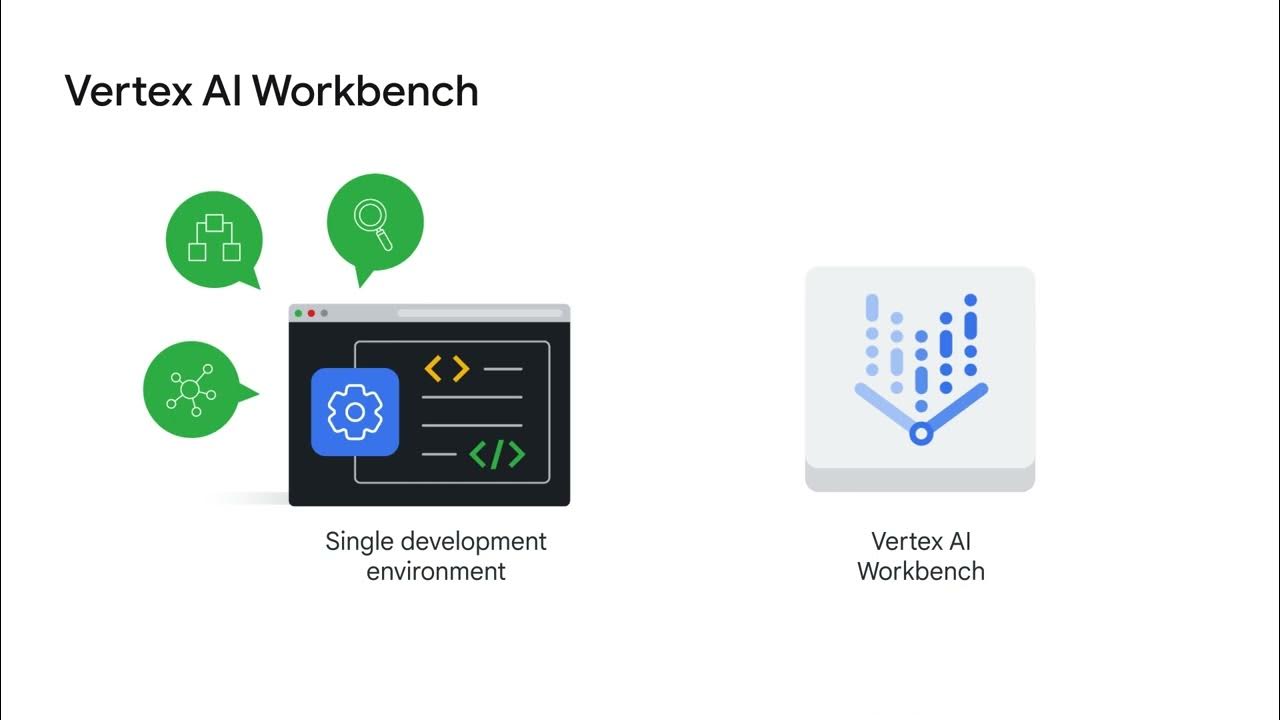Building ML models with Vertex AI
Summary
TLDRGoogle's Vertex AI streamlines machine learning model development for ML developers, data scientists, and engineers. It addresses traditional challenges like data handling, model selection, and computing power. Vertex AI offers a unified platform for model creation, management, and deployment, supporting both AutoML for ease of use and custom training for full control. It simplifies the workflow, enhances scalability, ensures sustainability through artifact reuse, and speeds up model production with fewer lines of code.
Takeaways
- 🤖 **Google's AI Journey**: Google has been investing in AI since the development of scikit-learn in 2007, leading to the creation of Vertex AI.
- 🌟 **AI Across Google**: Google applies AI technologies in various products like Gmail, Google Maps, Google Photos, and Google Translate.
- 🚀 **Challenges in ML**: Traditional challenges in machine learning include handling large data, choosing the right model, and computing power.
- 🔄 **Production Challenges**: Challenges in getting ML models into production include scalability, monitoring, and continuous integration and deployment.
- 📊 **Gartner's Insight**: According to Gartner, only half of Enterprise ML projects make it past the pilot phase.
- 🛠️ **Vertex AI Solution**: Vertex AI addresses production and ease of use challenges by providing a unified platform for ML workflows.
- 🔧 **Unified Platform Definition**: Vertex AI offers a single digital experience for creating, managing, and deploying ML models at scale.
- 📈 **Data and Feature Readiness**: Users can upload data and create features using the feature store for model input.
- 🎯 **Training and Tuning**: Vertex AI facilitates training, hyperparameter tuning, and experimentation with different models.
- 🔄 **Deployment and Monitoring**: The platform supports setting up pipelines for model deployment, monitoring, and continuous improvements.
- 👩💻 **Two Approaches**: Vertex AI allows building ML models through AutoML (no-code) for ease of use, or custom training for full control.
- 🏆 **Benefits of Vertex AI**: The platform offers seamless, scalable, sustainable, and speedy ML model development.
Q & A
What is the main challenge in developing machine learning models?
-Developing machine learning models involves challenges such as handling large quantities of data, choosing the right model to train the data, and ensuring sufficient computing power.
How does Google apply AI technologies to its products and services?
-Google applies AI technologies to products and services like Gmail, Google Maps, Google Photos, and Google Translate.
What are the production challenges that ML models face?
-Production challenges for ML models include scalability, monitoring, and the need for continuous integration and continuous delivery or deployment.
Why do many enterprise ML projects fail to get past the pilot phase?
-According to Gartner, only half of enterprise ML projects get past the pilot phase due to challenges in scaling, monitoring, and integrating ML models into production.
What is Google's solution to the challenges of ML model production and ease of use?
-Google's solution is Vertex AI, a unified platform that simplifies the machine learning ecosystem and workflow, addressing both production and ease of use challenges.
What does a unified platform mean in the context of Vertex AI?
-A unified platform in Vertex AI means having a single digital experience to create, manage, and deploy models over time and at scale.
What are the stages involved in the machine learning workflow according to the script?
-The stages involved in the machine learning workflow are data readiness, feature readiness, training and hyperparameter tuning, and deployment and model monitoring.
How does Vertex AI facilitate the data readiness stage?
-Vertex AI allows users to upload data from various sources like cloud storage, BigQuery, or a local machine during the data readiness stage.
What is a feature store and how does it relate to Vertex AI?
-A feature store is a place where users can create and share features, which are processed data inputs for models, within Vertex AI.
What are the benefits of using Vertex AI for building machine learning models?
-Vertex AI offers benefits such as seamless user experience, scalability, sustainability by reusing and sharing artifacts, and speed by producing models with fewer lines of code.
What are the two main options for building machine learning models in Vertex AI?
-Vertex AI allows users to build machine learning models with either AutoML, a no-code solution, or custom training, a code-based solution.
How does Vertex AI help data scientists focus on solving business problems?
-AutoML in Vertex AI is easy to use, allowing data scientists to spend more time turning business problems into ML solutions.
Outlines

このセクションは有料ユーザー限定です。 アクセスするには、アップグレードをお願いします。
今すぐアップグレードMindmap

このセクションは有料ユーザー限定です。 アクセスするには、アップグレードをお願いします。
今すぐアップグレードKeywords

このセクションは有料ユーザー限定です。 アクセスするには、アップグレードをお願いします。
今すぐアップグレードHighlights

このセクションは有料ユーザー限定です。 アクセスするには、アップグレードをお願いします。
今すぐアップグレードTranscripts

このセクションは有料ユーザー限定です。 アクセスするには、アップグレードをお願いします。
今すぐアップグレード5.0 / 5 (0 votes)






